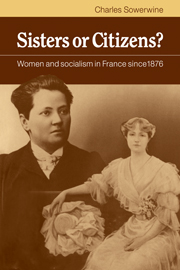Book contents
- Frontmatter
- Contents
- Preface
- Abbreviations of organisations
- Bibliographical abbreviations
- Introduction
- Part I Feminism and socialism 1876–1900
- Part II Origins of the socialist women's movement 1899–1914
- 4 The Groupe Féministe Socialiste 1899–1905
- 5 Women and the SFIO 1905–14
- 6 The Groupe des Femmes Socialistes 1913–14
- Part III Development and decline of the socialist women's movement 1914–79
- Conclusion
- Appendix 1 The Second International and the woman question 1889–1904
- Appendix 2 French socialist women in figures
- Appendix 3 Elisabeth Renaud and the Cambier affair
- Notes
- Bibliography
- Index
4 - The Groupe Féministe Socialiste 1899–1905
Published online by Cambridge University Press: 07 October 2011
- Frontmatter
- Contents
- Preface
- Abbreviations of organisations
- Bibliographical abbreviations
- Introduction
- Part I Feminism and socialism 1876–1900
- Part II Origins of the socialist women's movement 1899–1914
- 4 The Groupe Féministe Socialiste 1899–1905
- 5 Women and the SFIO 1905–14
- 6 The Groupe des Femmes Socialistes 1913–14
- Part III Development and decline of the socialist women's movement 1914–79
- Conclusion
- Appendix 1 The Second International and the woman question 1889–1904
- Appendix 2 French socialist women in figures
- Appendix 3 Elisabeth Renaud and the Cambier affair
- Notes
- Bibliography
- Index
Summary
Thus far we have seen the elimination of a number of possibilities for the political organisation of working women and their sympathisers. The attempt at a feminist alliance with socialism failed, although it made an important contribution to socialism. The attempts of individual women of feminist (and sometimes socialist) tendencies to work within the socialist parties failed too and left few traces. Finally, the attempts of feminists themselves to organise working women failed completely and were never to be renewed. Could working-class women be organised on a socialist basis by their fellow working women? The experience of the Groupe Féministe Socialiste (GFS) founded in 1899 suggests that they could.
Like its predecessors, the GFS sought to combat the oppression which women suffered both as women and as workers. It was, however, more successful than they had been. There were three reasons for this. First, it articulated effectively the experience and concerns of working women themselves. By its class-based approach and its links with the socialist parties as well as its authentically working-class origins, it identified itself with the most profoundly felt aspects of working women's experience. Second, by functioning within the socialist movement, it gave women the feeling that they could have some impact on reality, through a significant organisation. Third, at the same time, the GFS remained sensitive to the particular difficulties public life presented to women: it was autonomous from the socialist parties, functioning as a kind of women's section parallel to party organisations but separate from them and free of their intimidating male atmosphere.
- Type
- Chapter
- Information
- Sisters or Citizens?Women and Socialism in France since 1876, pp. 81 - 107Publisher: Cambridge University PressPrint publication year: 1982
- 1
- Cited by



